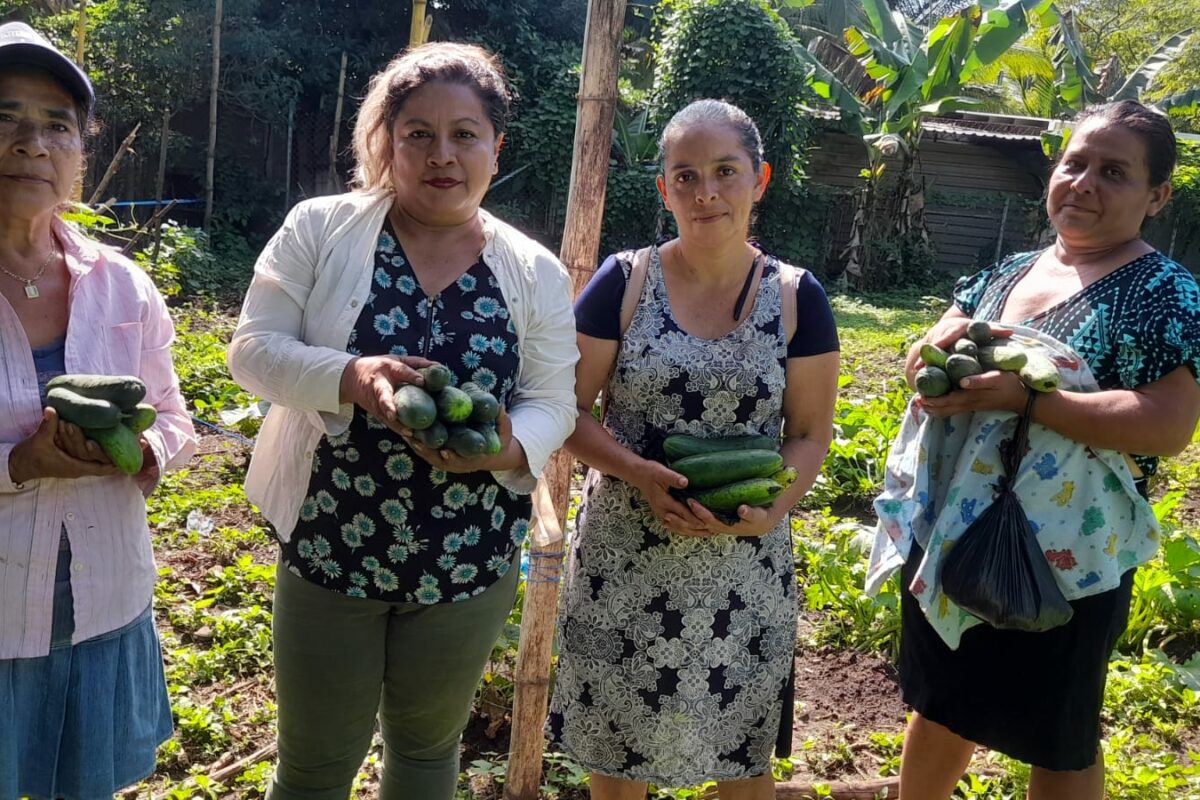
An inspiring example of women’s leadership comes from a group of ten women, members of ESPERA partner AMOS in El Salvador, who launched an organic home gardening project in June of this year. The idea was born during one of their monthly meetings, when participants discussed the rising cost of vegetables and growing health concerns in their community, including illnesses such as cancer and diabetes. From this conversation, a community-driven project emerged, demonstrating the power women have to take control of their food and well-being.
Rural women in Central America and around the world play a vital role in food production, environmental stewardship, and community resilience. They manage farms, conserve biodiversity, and lead efforts to adapt to climate change, often using ancestral knowledge passed down through generations. Despite their contributions, rural women face unique challenges, including marginalization, limited access to resources, and heightened vulnerability to climate-related impacts.
Each October 15th, the International Day of Rural Women celebrates the role of rural women and highlights the importance of gender equality and empowerment in addressing poverty, hunger, and malnutrition. At Mary’s Pence, we witness how rural women consistently turn challenges into opportunities, taking action to nourish their families, protect the earth, and lead their communities toward a more just and sustainable future.
“We carefully select crops that are both nutritious and suitable for our climate. Right now, we have collectively decided to grow cucumbers, radishes, squash, and tomatoes. To ensure successful growth, we begin with dedicated seedling days and then transplant the seedlings into our garden,” said Yanira, AMOS’ ESPERA coordinator.
The women of AMOS chose to garden organically.. “We do not use agrochemicals such as pesticides and fertilizers. With the support of Mary’s Pence, we obtained some organic supplies for our crops,” said Yanira.
Growing More than Vegetables
The project’s goals extend beyond providing healthy food for their families. Through this initiative, the women plan to expand their gardens, diversify the crops, and lower household expenses. In the future, as production expands, they aim to generate income while continuing to foster teamwork and serve as an inspiration to other women in the community. Ultimately, their efforts focus on improving the quality of life and protecting the land and natural resources for future generations from the harmful effects of chemicals and pesticides—placing rural women, like these gardeners, at the forefront of environmental stewardship and climate action.
“The harvested products are shared among all participants, ensuring that every family benefits from the work of the group. The project has a dual impact: it supports the economic well-being of the women by reducing household expenses and promotes better health through access to organic, chemical-free produce,” said a participant from AMOS.
“For the first time, I was able to prepare delicious pupusas with the radish leaves I grew myself, with the support of my compañeras,” Sandra, ESPERA member, shared with pride. Beyond the harvest, she highlights how enriching it has been to work collectively—sharing experiences, talking about their realities, and supporting one another has been fundamental. “This experience has not only given me new knowledge, but also confidence, motivation, and a true sense of community,” she affirms.
Sandra, a 37-year-old single mother, joined AMOS in January 2024. Later that year, she became part of the ESPERA program. She received a loan to start her small business, which offers beauty services and sells nutritional products. She also joined the family farming project—without any prior experience in cultivation or even using basic farming tools. With enthusiasm and dedication, she participated in cleaning the plot, preparing seedlings, and eventually harvesting her own vegetables, including cucumbers and radishes.
Organic Gardening Beyond El Salvador
Other ESPERA partner organizations, including ASMUR, Concertación, ACOMEST, and CESPPO, continue to promote similar home gardening efforts, encouraging more women to cultivate organic vegetables in El Salvador. In Nicaragua, partners are already working on organic gardens, while in Guatemala, plans are underway to begin next year. This shared—producing food with their families’ health in mind—demonstrates the growing awareness and commitment of rural women to sustainability and the well-being of their communities.
“This work has strengthened our leadership by giving us confidence, capacity, and a sense of security. We have learned to coordinate and organize as a group, and we practice listening to and supporting one another. Through this, our voices in the community have become stronger and more respected,” shared Yanira.
At the moment, women from AMOS are farming borrowed land and small patches in their houses, but “for the future, we dream of having our own land for cultivation where we can expand our production and create a dedicated space to sell our products. We also want to expand by raising laying hens. These dreams reflect our desire for sustainability, greater economic independence, and more opportunities for the women who participate,” Yanira concluded.
